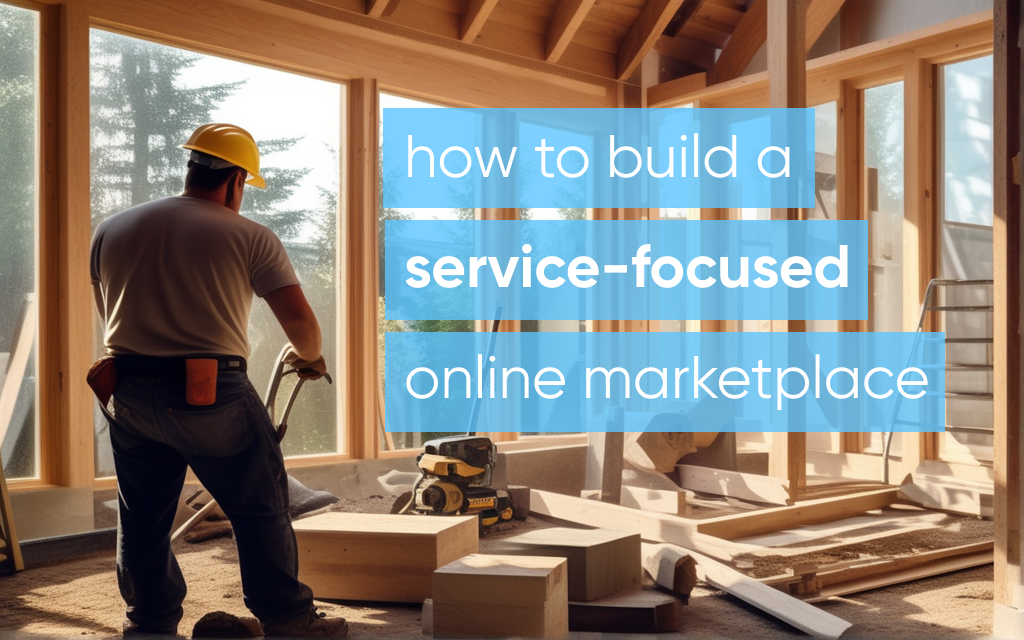
Table of Contents
- What's a Service Marketplace?
- Choosing the Right Type for Your Service Marketplace
- Examples of Successful Service Marketplaces
- Service-focused vs Product-focused Marketplace: Pros and Cons
- Building a Trustworthy Service Marketplace: Essential Requirements
- Building Your Service Marketplace: Step-by-Step Guide
- Unlock Potential with CS-Cart Multi-Vendor
What's a Service Marketplace?
Imagine you have a unique talent or skill, like playing a musical instrument or fixing things around the house. On the other side, picture someone who needs those specific skills, like a person looking for a guitar teacher or someone needing help with home repairs. Now, think of a place where these two groups meet effortlessly—that's what we call an online service marketplace.
In simple terms, a service marketplace is like a digital meeting point where people who offer services (like tutoring, designing, or fixing things) connect with people who need those services. It's like an online marketplace where you can find experts and professionals willing to help you with various tasks or teach you something new.
.webp)
Let's bring this idea to life with a few examples:
- Freelance Platforms: Imagine a platform where talented freelancers offer their skills—graphic designers, writers, or even social media experts. Businesses or individuals looking for these services can easily find and hire the right person for their needs. Upwork is a great example of such a service marketplace.
- Local Services: Think about a website where you can find someone trustworthy to fix your leaky faucet, mow your lawn, or clean your house. TaskRabbit is a service marketplace that connects people with local service providers for tasks like these.
- Learning Platforms: Consider a place where you can learn a new language, take up coding, or even enhance your cooking skills. Udemy is a service marketplace where educators offer online courses, and people looking to learn can enroll in these courses. Similarly, Promova offers a structured and user-friendly platform for individuals aiming to boost their language proficiency.
So, in a nutshell, an online service marketplace is like a digital hub where skills and services meet needs and demands, making it easier for everyone to find what they're looking for on a service marketplace website.

Upwork, the largest work marketplace
Choosing the Right Type for Your Service Marketplace
As an entrepreneur venturing into the dynamic world of service marketplaces, selecting the right type is a crucial strategic decision. Understanding the distinct offerings of each type will guide you in aligning your platform with the needs of your target audience, creating a compelling and user-friendly service marketplace website. Let's explore how different types cater to specific entrepreneurial goals within the broader landscape of service marketplaces:
Professional Services Marketplaces:
- Entrepreneurial Focus: Ideal for platforms emphasizing professional collaborations and freelancing opportunities in the realm of selling services online. A service-based marketplace offers the infrastructure to help businesses find the right expertise.
- In Action: Imagine creating a service marketplace where skilled professionals offer their services globally. Platforms like Upwork serve as inspiration, connecting businesses with specialized talent on this thriving online marketplace.
Local Services Marketplaces:
- Entrepreneurial Focus: Suited for entrepreneurs aiming to connect local service providers with nearby consumers on their service marketplace website.
- In Action: Consider a platform facilitating immediate and localized services, such as home repairs or pet care. TaskRabbit provides a model for connecting users with nearby service experts, showcasing the potential of local services marketplaces.
Online Education and Skill Development Platforms:
- Entrepreneurial Focus: Tailored for those passionate about providing a virtual space for skill acquisition and knowledge exchange within the broader scope of marketplaces.
- In Action: Envision creating a platform where educators offer diverse online courses. Udemy exemplifies success in this entrepreneurial niche, demonstrating the growth potential of online service marketplaces in the realm of education.
Health and Wellness Service Marketplaces:
- Entrepreneurial Focus: Suited for those aiming to enter the virtual health and wellness service sector, connecting users with fitness trainers or mental health professionals on their service marketplace website.
- In Action: Picture launching a platform where users can book virtual wellness sessions. BetterHelp serves as a noteworthy example in this space, showcasing the potential of virtual health services marketplaces within the broader online marketplace landscape.
Event and Entertainment Service Marketplaces:
- Entrepreneurial Focus: Ideal for entrepreneurs interested in event planning and entertainment services on their online marketplace.
- In Action: Think of creating a platform where users can find event planners and entertainers. GigSalad stands out as a successful model in this entrepreneurial arena, highlighting the diverse opportunities within service marketplaces catering to events and entertainment.

BetterHelp, a marketplace to look for professional therapists
Strategic Considerations
- Target Audience: Identify your target users and their specific needs within the vast landscape of service marketplaces.
- Market Demand: Assess the demand for different types of services in your target market within the broader scope of online marketplaces.
- Niche Opportunities: Explore niche opportunities within each type to distinguish your platform and position it prominently within the competitive space of online service marketplaces.
- Scalability: Consider the scalability of your chosen type and its potential for future growth within the broader ecosystem of services marketplaces.
By strategically aligning your entrepreneurial goals with the unique offerings of each type, you can set the foundation for a successful journey in the expansive and ever-growing world of service marketplaces. As we proceed, we'll delve into inspiring examples within each category, offering valuable insights to empower you in shaping and launching your online service marketplace venture.
Examples of Successful Service Marketplaces
Exploring the landscape of eCommerce marketplaces reveals a dynamic world where innovative business models have transformed industries. Let's delve into some of the most successful service marketplaces, showcasing the diverse possibilities and shedding light on crucial elements that contribute to their success.
Upwork
- Overview: Upwork stands out as a giant in the online marketplaces arena, leveraging its platform to connect freelancers with businesses and individuals in need of various skills.
- Services Offered: On this marketplace platform, users can find professionals, including writers, designers, web developers, and more, making it a versatile hub for skill exchange.
- Success Factors: Upwork's success is attributed to its robust paid advertising strategies, ensuring a broad user base and effective matchmaking between skilled freelancers and clients.
Talkspace
- Overview: Talkspace has redefined mental health care, positioning itself as a leading services marketplace in the service industry. Its innovative idea makes therapy more convenient, accessible, and affordable.
- Services Offered: This mental health-focused marketplace connects users with therapists instantly, providing a vital service in the online marketplace landscape.
- Success Factors: Talkspace's success is amplified by its targeted advertising, creating awareness and accessibility for mental health services on its ecommerce platform.
TaskRabbit
- Overview: TaskRabbit has established itself as a prominent player in the advertising space within service marketplaces. This same-day services marketplace connects users with skilled labor for various tasks, from furniture assembly to home repairs and errands.
- Services Offered: Users benefit from the platform's efficiency in finding the right person for the job, leveraging its robust business models for task-based services.
- Success Factors: TaskRabbit's success is intertwined with strategic paid advertising, ensuring visibility and engagement on its marketplace platform.
Postmates
- Overview: Postmates has carved its niche in the eCommerce marketplaces scene, distinguishing itself as an ecommerce website with a unique business idea. It goes beyond traditional food delivery to include a diverse range of goods.
- Services Offered: Users can seamlessly order food, groceries, and other essentials, making Postmates a comprehensive ecommerce platform.
- Success Factors: Postmates' success is driven by its innovative business models, combining food delivery with a broad spectrum of goods, supported by effective advertising.
VIPKid
- Overview: VIPKid is a trailblazer in the service industry, connecting English teachers with students globally through a unique idea. Its rigorous screening process ensures quality education on its online marketplace.
- Services Offered: The platform screens teachers before they work, setting a high standard for the service business it provides.
- Success Factors: VIPKid's success is fortified by its focus on quality education and strategic paid advertising, positioning itself as a leader in the online marketplaces catering to learning.
Touristo.ai
- Overview: Touristo is a specialized services marketplace built with CS-Cart Multi-Vendor, dedicated to connecting travelers with a diverse range of travel services. Its mission revolves around simplifying the travel planning and booking process, providing users with a seamless platform to create and book their ideal trips.
- Services Offered: Touristo stands out by offering a comprehensive suite of travel services, encompassing everything from food delivery and transportation to curated tours and activities. It serves as a one-stop destination for all aspects of travel, enhancing the convenience and experience for users.
- Success Factors: Touristo's success is driven by its commitment to partner success through strategic marketing and promotional opportunities, including sponsored listings, featured placements, and targeted email campaigns, all facilitated by its foundation on CS-Cart Multi-Vendor. The platform's collaborative approach with vendors ensures a tailored experience, understanding specific needs and goals. This mutual understanding establishes a symbiotic relationship, enriching the overall platform experience for users and partners alike.

Touristo.ai, a marketplace built with CS-Cart Multi-Vendor
These examples not only showcase the most successful service marketplaces but also emphasize the critical role of paid advertising, innovative business models, and strategic positioning within the service industry. As we progress, we'll unravel more insights into the dynamics of these successful service marketplaces, providing valuable lessons for entrepreneurs shaping their own ventures in this dynamic online marketplace landscape.
Service-Focused vs. Product-Focused Marketplaces
In the dynamic world of digital marketplaces, understanding the nuances between service-focused and product-focused platforms is crucial for attracting customers and creating a successful marketplaces model. Let's delve into the key elements, incorporating essential keywords, and explore when it's advantageous for a marketplace owner to venture into a service-focused or product-focused approach.
Service-Focused Marketplaces
Overview: Service-focused marketplaces connect users with individuals or businesses offering various services, from freelancers providing skills to professionals offering expertise.
Pros:
- Personalization: Services can be tailored to individual needs, fostering a personalized and often unique experience.
- Low Overheads: Fewer logistical challenges compared to handling physical products, leading to potentially lower overhead costs for the marketplace owner.
Cons:
- Dependency on a Service Provider: Success relies heavily on the availability and expertise of service providers.
- Intangibility: Services are intangible, making it challenging for users to preview or test before purchase, impacting customer experience.
Product-Focused Marketplaces
Overview: Product-focused marketplaces center around the buying and selling of physical goods, ranging from everyday items to unique and specialized products.
Pros:
- Tangibility: Physical products offer a tangible and visible experience for users, making it easier to understand and evaluate, enhancing the customer experience.
- Global Reach: Products can be shipped and sold globally, expanding the potential market reach and attracting customers.
Cons:
- Logistical Challenges: Handling inventory, shipping, and returns can introduce logistical complexities for the marketplace owner.
- Competitive Pricing: Price competition may be intense due to a wide array of similar products, requiring strategic use of paid ads and featured listings.
When to Choose a Service Marketplace
- Unique Skills: If your business idea revolves around connecting individuals with unique skills or expertise, attracting customers seeking those specific services.
- Low Initial Investment: If you prefer a business model with potentially lower initial investment and operational overhead, possibly through subscription fees or other revenue models.
When to Choose a Product-Oriented Marketplace
- Scalability: If your goal is to create a scalable business with global reach and a diverse product range, necessitating strategic use of paid ads and featured listings.
- Physical Goods: If your passion lies in showcasing and selling tangible products to a broad audience, optimizing online payments for seamless transactions.
Understanding these differences and considering your specific goals will guide you, as a marketplace owner, in deciding whether a service-focused or product-focused marketplace aligns better with your vision for a successful marketplace, one that not only attracts customers but also ensures a thriving service provider community and satisfied users.
Building a Trustworthy Service Marketplace: Essential Requirements
As you embark on the journey of creating your own services marketplace, several essential requirements must be considered to ensure its success. Beyond the technical aspects, factors like trust, security, and the choice of a reliable service marketplace software play pivotal roles in shaping a thriving online ecosystem.

1. Robust Marketplace Platform
Selecting the right marketplace platform is foundational. A robust platform provides the necessary tools for creating, managing, and scaling your service-focused marketplace. Look for features like user-friendly interfaces, seamless payment integrations, and scalability to accommodate your marketplace's growth.
2. User-Friendly Interface
A user-friendly interface is key to attracting customers and retaining both service providers and customers. Ensure that the platform is intuitive, easy to navigate, and offers a seamless experience for users to browse, list services, and make transactions.
3. Secure Payment Processing
Trust is paramount in online transactions. Implement secure payment processing systems to protect both service providers and customers. This includes encryption technologies, compliance with payment industry standards, and transparent communication about your platform's security measures.
4. Verified User Profiles
Building trust begins with verifying the service provider identities. Implement a thorough vetting process that includes identity verification, qualifications, and reviews to establish credibility. Verified user profiles contribute to a safer and more trustworthy marketplace.
5. Clear Terms of Service
Define and communicate clear terms of service to all users. This includes outlining fees, responsibilities, and dispute resolution processes. Complete transparency in policies fosters trust and sets expectations for both service providers and customers.
6. Review and Rating System
Integrate a robust review and rating system. Genuine feedback from users builds credibility and helps others make informed decisions. Encourage users to leave reviews and continuously monitor and address any concerns raised through the system.
7. Customer Support
Provide responsive customer support to address queries, concerns, and disputes promptly. A reliable support system enhances user experience and showcases your commitment to ensuring a positive experience within the marketplace.
8. Comprehensive Legal Framework
Establish a comprehensive legal framework for your service marketplace. This includes terms of use, privacy policies, and compliance with relevant regulations. A legally sound foundation fosters trust among users and ensures the marketplace operates ethically.
9. Scalability Planning
Anticipate the growth of your marketplace and plan for scalability. Choose a marketplace software that can grow with your business, accommodating an increasing number of users, transactions, and service categories.
10. Security Measures
Prioritize security at every level of your platform. Implement measures to protect user data, secure payment transactions, and guard against potential cyber threats. A secure marketplace builds trust and safeguards the sensitive information of your users.
Building a service marketplace involves more than just technology; it's about establishing a foundation of trust, security, and reliability. By carefully addressing these essential requirements, you lay the groundwork for a successful service-focused marketplace that not only attracts customers but retains them through a positive and secure online experience. Choose your service marketplace software wisely, implement stringent security measures, and prioritize transparency to build a thriving online community and ensure successful transactions for both service providers and customers.
Building Your Service Marketplace: Step-by-Step Guide
Embarking on the journey to create your own service marketplace requires a thoughtful approach. Let's explore each step in detail, incorporating specific actions and considerations for entrepreneurs, while seamlessly integrating crucial keywords to enhance the visibility and success of your venture.
Step 1. Find and Validate Your Marketplace Idea
Whether you're creating a niche platform or a broad marketplace for services, it's crucial to validate your idea with real user feedback. Identify a niche that aligns with your passion, perhaps connecting private individuals seeking unique services. Research demand by leveraging tools like Google Trends and engaging in conversations on social media to identify relevant keywords. Understanding the problems in your chosen business will guide your marketplace idea.
Step 2. Decide on the Marketplace Platform
Select a reliable and scalable marketplace platform, like CS-Cart Multi-Vendor, a specifically designed solution for entrepreneurs. This specialized marketplace software ensures easy service listing, secure transactions, and efficient management tools. Consider features that address the pain points of both entrepreneurs and service providers.
Step 3. Launch a Marketplace MVP
Recognize the significance of an MVP (Minimum Viable Product) as a strategy to test your concept. This approach is specifically designed to save resources and gather valuable user feedback before a full-scale launch. Incorporate content marketing to communicate your MVP's benefits, attracting individuals and service providers alike.
Step 4. Start Attracting Service Providers
Utilize online platforms such as LinkedIn and freelance websites to attract individuals offering services. Tailor your messaging to showcase the benefits of your marketplace and how it addresses the pain points of service providers. Ensure a streamlined onboarding process to attract the right provider quickly.
Step 5. Evaluate and Refine Your Marketplace
Examples like Upwork and Catalant show how a professional services marketplace can scale with the right vetting, search, and billing systems in place. Continuously refine your marketplace based on user feedback and data analysis. Introduce new features or optimize existing ones to enhance the user experience. Regularly assess your marketplace service provider pool to ensure a diverse and high-quality offering. Measure success by how well you address the pain points identified in the service business.
Step 6. Promote Your Marketplace with Ads and SEO
Focus on local SEO strategies, incorporating relevant keywords to optimize your website for local search terms. List your business on Google My Business and encourage satisfied users to leave positive reviews. Utilize online advertising platforms where your target audience is active to attract customers effectively through strategic content marketing. Measure success by analyzing the effectiveness of your promotional efforts.
In summary, building a service marketplace involves understanding your audience, selecting the right tools, and continuously refining your platform based on user experiences. By strategically incorporating these keywords at each step, entrepreneurs can create a vibrant and valuable service marketplace tailored to the needs of their local community, effectively addressing the pain points of service providers and private individuals alike.
Unlock Potential with CS-Cart Multi-Vendor
As you embark on the journey of building your service marketplace, consider the power of CS-Cart Multi-Vendor, a specialized platform designed for entrepreneurs like you. This feature-rich marketplace software provides a robust foundation for managing services, ensuring secure transactions, and fostering seamless interactions between individuals and service providers.
Key Features
- Easy Service Listing: Effortlessly showcase a variety of services with user-friendly listing options.
- Secure Transactions: Ensure the safety of financial transactions for both providers and customers.
- Efficient Management Tools: Streamline your operations with tools crafted for the unique dynamics of service-based marketplaces.
- Powerful Provider Management System: Take control of your service providers, promote them, attract more providers, and build a loyal vendor crowd.
CS-Cart Multi-Vendor empowers you to overcome the challenges of building and managing a service marketplace platform, allowing you to focus on what matters most—providing an exceptional platform that meets the diverse needs of your community. Unleash the potential of your service-oriented marketplace with CS-Cart Multi-Vendor and turn your vision into a thriving reality.




